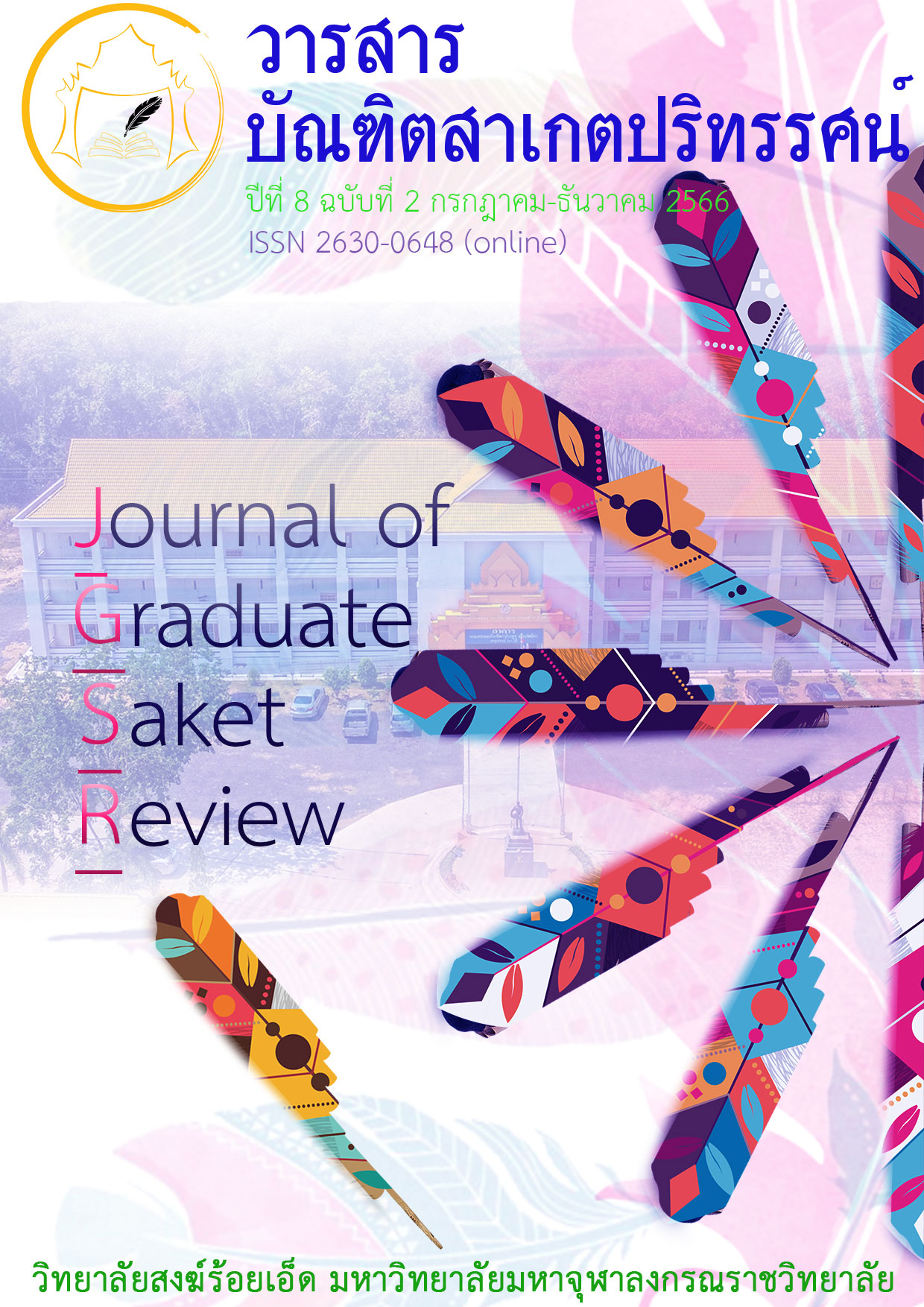การจัดการเรียนรู้โดยใช้งานทางคณิตศาสตร์ที่ส่งเสริมการแก้ปัญหาทางคณิตศาสตร์ เรื่อง ลำดับและอนุกรม ของนักเรียนชั้นมัธยมศึกษาปีที่ 5 -
Main Article Content
บทคัดย่อ
การวิจัยนี้มีวัตถุประสงค์เพื่อศึกษาแนวการจัดการเรียนรู้โดยใช้งานทางคณิตศาสตร์ และศึกษาผลการจัดการเรียนรู้โดยใช้งานทางคณิตศาสตร์ที่มีต่อความสามารถในการแก้ปัญหาทางคณิตศาสตร์ เรื่อง ลำดับและอนุกรม ของนักเรียนชั้นมัธยมศึกษาปีที่ 5 กลุ่มเป้าหมาย คือ นักเรียนชั้นมัธยมศึกษาปีที่ 5 จำนวน 13 คน ของโรงเรียนมัธยมแห่งหนึ่งในจังหวัดอุตรดิตถ์ ในภาคเรียนที่ 2 ปีการศึกษา 2565 ผู้วิจัยใช้รูปแบบการวิจัยปฏิบัติการในชั้นเรียน จำนวน 3 วงจรปฏิบัติการ ใช้ระยะเวลาทั้งหมด 12 คาบเรียน เครื่องมือที่ใช้ในการวิจัย ได้แก่ แผนการจัดการเรียนรู้ซึ่งใช้งานที่มีความต้องการเชิงรู้ระดับต่ำ และงานที่มีความต้องการเชิงรู้ระดับสูง แบบสะท้อนผลการจัดการเรียนรู้ ใบกิจกรรม และแบบวัดทักษะการแก้ปัญหาทางคณิตศาสตร์ วิเคราะห์ข้อมูลโดยใช้การวิเคราะห์เชิงเนื้อหา และตรวจสอบแบบสามเส้า ผลการวิจัย พบว่า 1) แนวการจัดการเรียนรู้โดยใช้งานทางคณิตศาสตร์ที่ส่งเสริมการแก้ปัญหาทางคณิตศาสตร์ มีประเด็นที่ควรเน้น ได้แก่ งานที่ใช้ควรเป็นงานที่มีความต้องการเชิงรู้ระดับต่ำอย่างน้อย 1-2 งานก่อนใช้งานที่มีความต้องการเชิงรู้ระดับสูง เพื่อตรวจสอบความเข้าใจและนำไปสู่การแก้สถานการณ์ปัญหาที่ครูกำหนดให้ได้ การออกแบบสถานการณ์ปัญหาควรออกแบบให้สอดคล้องกับชีวิตประจำวันของนักเรียนให้มากที่สุด เป็นสถานการณ์ใกล้ตัวอยู่ในบริบทชีวิตจริง ครูควรคำนึงถึงความแตกต่างของความสามารถในการเรียนรู้ ควรสอบถามนักเรียนเพิ่มเป็นรายบุคคลและยกตัวอย่างเพิ่มเติมให้นักเรียนเข้าใจในเรื่องนั้น และครูควรตั้งคำถามเพื่อชี้ให้เห็นถึงประเด็นสำคัญ และ 2) นักเรียนส่วนใหญ่มีความสามารถในการทำความเข้าใจปัญหา การเลือกใช้วิธีการแก้ปัญหา และการสรุปคำตอบอยู่ในระดับดีและดีมาก กล่าวได้ว่าจัดการเรียนรู้โดยใช้งานทางคณิตศาสตร์ช่วยพัฒนาความสามารถในการแก้ปัญหาทางคณิตศาสตร์ของนักเรียนได้
Article Details

อนุญาตภายใต้เงื่อนไข Creative Commons Attribution-NonCommercial-NoDerivatives 4.0 International License.
เนื้อหาและข้อมูลในบทความที่ลงตีพิมพ์ในวารสารบัณฑิตสาเกตปริทรรศน์ ถือเป็นข้อคิดเห็นและความรับผิดชอบของผู้เขียนบทความโดยตรงซึ่งกองบรรณาธิการวารสาร ไม่จำเป็นต้องเห็นด้วย หรือร่วมรับผิดชอบใด ๆบทความ ข้อมูล เนื้อหา รูปภาพ ฯลฯ ที่ได้รับการตีพิมพ์ในวารสารบัณฑิตสาเกตปริทรรศน์ ถือเป็นลิขสิทธิ์ของวารสารบัณฑิตสาเกตปริทรรศน์ หากบุคคลหรือหน่วยงานใดต้องการนำทั้งหมดหรือส่วนหนึ่งส่วนใดไปเผยแพร่ต่อหรือเพื่อกระทำการใด ๆ จะต้องได้รับอนุญาตเป็นลายลักอักษรจากวารสารบัณฑิตสาเกตปริทรรศน์ ก่อนเท่านั้น
เอกสารอ้างอิง
กระทรวงศึกษาธิการ. (2560). ตัวซี้วัดและสาระการเรียนรู้แกนกลางกลุ่มสาระการเรียนรู้คณิตศาสตร์ (ฉบับปรับปรุง พ.ศ. 2560) ตามหลักสูตรแกนกลางการศึกษาชั้นพื้นฐานพุทธศักราช 2551. กรุงเทพมหานคร: ชุมนุมสหกรณ์การเกษตรแห่งประเทศไทย.
พนินดา ดีหลี. (2563). การศึกษาผลสัมฤทธิ์ทางการเรียนคณิตศาสตร์และความสามารถในการแก้ปัญหาทางคณิตศาสตร์ของนักเรียนชั้นมัธยมศึกษาปีที่ 5 เรื่อง ลำดับและอนุกรม โดยใช้รูปแบบ SSCS ร่วมกับการใช้คำถาม. วิทยานิพนธ์การศึกษามหาบัณฑิต สาขาการสอนคณิตศาสตร.์ มหาวิทยาลัยบูรพา.
ปรีชา เนาว์เย็นผล. (2538). การแก้ปัญหาคณิตศาสตร์การพัฒนาทักษะการคิดคำนวณของนักเรียนระดับประถมศึกษา. กรุงเทพมหานคร: โรงพิมพ์จุฬาลงกรณ์มหาวิทยาลัย.
รุ่งทิวา บุญมาโตน, วนินทร สุภาพ และรัชฏา วิริยะพงศ์. (2561). การพัฒนาการรู้เรื่องคณิตศาสตร์ เรื่อง ความน่าจะเป็นของนักเรียนชั้นมัธยมศึกษาปีที่ 5 ด้วยการจัดการเรียนรู้โดยใช้บริบทเป็นฐาน. วารสารวิทยบริการ มหาวิทยาลัยสงขลานครินทร์. 29(2): 51-61.
วชิระ อินทร์อุดม. (2539). ในเอกสารประกอบการสอนรายวิชาการผลิตสื่อวีดิทัศน์เพื่อการศึกษา. ภาควิชาเทคโนโลยีทางการศึกษา. คณะศึกษาศาสตร์ มหาวิทยาลัยขอนแก่น.
วรรณิสา เมืองโคตร และณัชชา กมล. (2560). การส่งเสริมความสามารถในการแก้ปัญหาทางคณิตศาสตร์ของนักเรียนชั้นมัธยมศึกษาปีที่ 1 โดยใช้งานทางคณิตศาสตร์. งานประชุมวิชาการคณิตศาสตร์ประจำปี ครั้งที่ 22 : การประชุมประจำปีทางคณิตศาสตร์ 2017.
สถาบันส่งเสริมการสอนวิทยาศาสตร์และเทคโนโลยี. (2555). ทักษะและกระบวนการทางคณิตศาสตร์. กรุงเทพมหานคร: ซีเอ็ดยูเคชั่น.
สถาบันส่งเสริมการสอนวิทยาศาสตร์และเทคโนโลยี. (2560). รายงานผลการวิจัยโครงการ TIMSS 2011 วิชาคณิตศาสตร์. เรียกใช้เมื่อ 12 มิถุนายน 2562 จาก https://drive.google.com/file/d/0BwqFSkq5b7zSbUdGWmU2QkQwT00/view?resourcekey=0jD8uOJrQRS58ZKLVVwkFDg.
สิรินภา กิจเกื้อกูล. (2557). การจัดการเรียนรู้วิทยาศาสตร์ ทิศทางสำหรับครูทศวรรษที่ 21. เพชรบูรณ์: จุลดิสการพิมพ์.
สำนักงานเลขาธิการสภาการศึกษา. (2550). แนวทางการจัดการเรียนรู้แบบประสบการณ์และที่เน้น การปฏิบัติ. (พิมพ์ครั้งที่ 1). กรุงเทพมหานคร: ชุมนุมสหกรณ์การเกษตรแห่งประเทศไทย.
อัมพร ม้าคนอง. (2553). ทักษะและกระบวนการทางคณิตศาสตร์: การพัฒนาเพื่อพัฒนา. (พิมพ์ครั้งที่ 3). กรุงเทพมหานคร: โรงพิมพ์แห่งจุฬลงกรณ์มหาวิทยาลัย.
อัมพร ม้าคนอง. (2554). ทักษะและกระบวนการทางคณิตศาสตร์: การพัฒนาเพื่อพัฒนา. กรุงเทพมหานคร: โรงพิมพ์แห่งจุฬลงกรณ์มหาวิทยาลัย.
อัมพร ม้าคนอง. (2557). คณิตศาสตร์สำหรับครูมัธยม. กรุงเทพมหานคร: จุฬาลงกรณ์มหาวิทยาลัย.
Boonmatone, R., Supap, W., & Wiriyapong, R. (2018). Development of Mathematics Literacyon Probability of Mathayomsuksa 5 Students by Context-Based Learning Management. Academic Resources Journal Prince of Songkla University, 29(2): 51-61.
Cai, J., & Lester, F. (2010). Why is teaching with problem solving important to student learning? (Problem solving research brief). Reston, VA: National Council of Teachers of Mathematics.
Deelee, P. (2020). A Study of Mathematics Learning Achievement and Mathematical Problem Solving Ability of Mathayomsuksa 5 Students on Sequence and Series Using SSCS Model and Questions. Thesis. Master of Education, Mathematics Teaching. Burapha University.
In-Udom, W. (1996). In teaching documents for the course on video production for education. Department of Educational Technology Faculty of Education. Khon Kaen University.
Institute for the Promotion of Teaching Science and Technology. (2012). Mathematics skills and processes. Bangkok: SE-EDUCATION.
Institute for the Promotion of Teaching Science and Technology. (2017). Research report of the TIMSS 2011 project in Mathematics. Retrieved June 12, 2019 from https://drive.google.com/file/d/0BwqFSkq5b7zSbUdGWmU2QkQwT00/view?resourcekey=0-jD8uOJrQRS58ZKLVVwkFDg.
Kitkuakul S. (2014). Science learning management direction for teachers of the 21st decade. Phetchabun: Juladit Printing.
Makanong, A. (2010). Mathematical Skills and Processes: Development for Development. (3rd ed). Bangkok: Chulalongkorn University Printing House.
Makanong, A. (2011). Mathematical Skills and Processes: Development for Development. Bangkok: Chulalongkorn University Printing House.
Makanong, A. (2014). Mathematics for high school teachers. Bangkok: Chulalongkorn University.
Ministry of Education. (2017). The measure and the core learning content of the mathematics learning group. (Revised edition 2017) according to the basic education core curriculum, 2008. Bangkok: Agricultural Cooperative Federation of Thailand.
Muangkot, W. & Kamol. N. (2017). Promoting Mathematical Problem Solving Ability of Mathayomsuksa 1 Students by Using Mathematics Tasks. conferenceAnnual Mathematics Academic Year No. 22 : Annual Meeting in Mathematics 2017.
Naoyenpol, P. (1995). Solving Mathematics Problems, Developing Students’ Computational Skills. Elementary level. Bangkok: Chulalongkorn University Printing Press.
Office of the Secretariat of the Council of Education. (2007). Experiential and practice-based learning management approaches. (1st edition). Bangkok: Agricultural Cooperative Federation of Thailand.
Stein, M. K., Smith, M. S., Henningsen, M., & Silver, E. A. (2000). Implementing standards based mathematics instruction: A casebook for professional development. New York: Teachers College Press.
Yeo, B. W. (2007). Mathematical tasks: Clarification, classification and choice of suitable tasks for different types of learning and assessment. National Institute of Education, Nanyang Technological University, Singapore.


